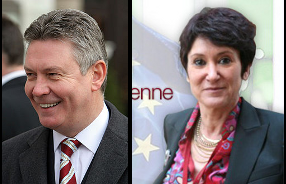Noncommunicable diseases in the 2011 global public health agenda
Noncommunicable diseases (NCDs) enjoy a place of prominence on the global public health agenda in 2011. At the 128th WHO EB, the assembly was abuzz with news of a joint Russian and WHO initiative, the “First global ministerial conference on healthy lifestyles and noncommunicable disease control” to be held in Moscow on 28-29 April 2011 and the UN High-level Meeting of the General Assembly on Non-Communicable Diseases in September 2011.
Judit Rius takes position as U.S. Manager of MSF’s Campaign for Access to Essential Medicines
At the end of the month, Judit Rius will be leaving KEI and joining MSF in New York as U.S. Manager of MSF’s Campaign for Access to Essential Medicines. Judit has been with KEI since 2006, and from the beginning, contributed greatly to nearly every aspect of KEI’s work. We will miss her a lot. At MSF, Judit will work closely with another talented former KEI lawyer, Michelle Childs. We wish Judit well in her new position, and congratulate MSF on the appointment.
KEI comments on Tibotec voluntary licenses of a new HIV-AIDS product
Today, Tibotec, a subsidiary of Johnson & Johnson, announced it has signed voluntary licensing agreements with several Indian and South African generic companies to allow generic competition on a new HIV-AIDS treatment, the investigational non-nucleoside reverse transcriptase inhibitor rilpivirine hydrochloride (TMC278) (rilpivirine hydrochloride), to certain developing countries. Continue Reading
Le Monde: L’OMS face à un nouveau conflit d’intérêts
The following is an article by Agathe Duparc which appeared on page four of the Sunday/Monday edition (23 January-24 January 2011) of Le Monde with a reference on the cover page. Below the article are two paragraphs providing readers with more background information on the World Health Assembly and the Executive Board. The third paragraph is the main quote highlighted in the print version. What is missing in this copy below is a cartoon accompanying the piece which shows a bespectacled man with a body of an octopus holding two syringes in a field of dollar signs. Continue Reading
Response to Mary Moran on managing conflicts of interest at the WHO CEWG
WHO Executive Board accepts appointment of Herrling to Consultative Expert Working Group on R&D
After several days of negotiations, the 128th WHO Executive Board has accepted the nomination of Paul Herrling to the new WHO Consultative Expert Working Group on R&D Financing, despite the fact that Herrling is an executive of Novartis, and is the author of the IFPMA/Novartis/FRIND proposal and the co-author of the PDP Plus proposal, which will be considered by the CEWG.
Nine civil society groups write WHO Executive Board about conflict of interest on WHO R&D Financing group
On January 20, 2011, 9 civil society organizations sent a letter to the WHO Executive Board registering an objection to the selection of Dr. Paul Herrling of Novartis to the WHO Consultative Expert Working Group on Research and Development: Financing and Coordination. The groups signing the letter were:
- CIDEPRO
- Déclaration de Berne – Berne Declaration
- HAI Europe
- HAI Global
- Health GAP (Global Access Project)
WHO Conflict of Interest Guidelines
WHO has kindly made available its conflict of interest guidelines. Apparently they are not available from the public web page. Attached are two documents:
A few of the many interesting provisions follow:
I. MEANING OF “CONFLICT OF INTEREST”Ska Keller tables MEP question on ethical aspects of pharmaceutical test data protection
On Tuesday the 18th of January 2010,German Green MEP Franziska Keller tabled this Parliamentary question:

